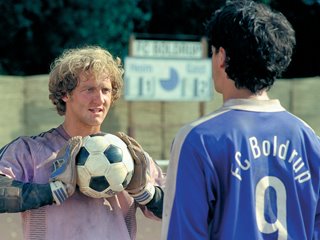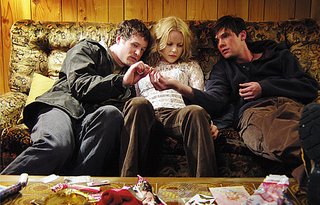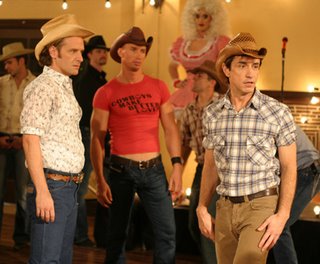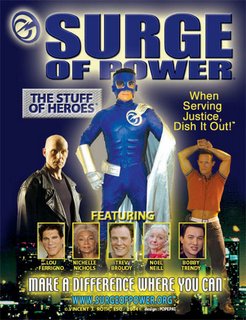Outfest in Review: Week One
If there's any question as to the state of gay filmmaking today, the first week of the 26th annual Outfest Gay and Lesbian Film Festival should answer it with a resounding statement: "We're doing great!"
Indeed, the festival contains its share of drivel and dreck, but by and large, this year's crop of features show that gay filmmakers have finally caught on to the notion that not all gay movies need to be coming-out stories or stories about doomed romances and tragic heroes who never get the guy. Having seen just six of the movies so far, I can attest that a refreshing diversity of genre is also on display at the fest, where the filmmakers are ably helming comedies, dramas, documentaries and everything in between with confidence and vision.
 Some of the best movies are those dealing with familial relations, as in Ingo Rasper's delightfully screwball German dramedy Fashion Victims, about a teenage boy who unknowingly begins a flirtation with his father's chief competitor in selling women's clothing to local stores. With his plans for summer vacation put on hold due to his father's scuffle with the law, Karsten (Florian Bartholomäi) is understandably pissed, but things begin looking up when he meets handsome Steven (Roman Knizka) at the dry cleaners. Their romance unfolds against the comic shtick and the family drama that Rasper dishes out with a steady hand, and it's at once tender and complicated. There's a good deal of comic hamming from Edgar Selge as Karsten's increasingly flustered father, Wolfie, who becomes desperate as things begin to spin out of his control. It's nice to see Karsten's sexuality treated so matter-of-factly in the movie (when his father finds out, he takes the news rather well, especially considering who his son's lover is), and the coming-out story is integrated nicely with a subplot about Wolfie's failing marriage with Karsten's mother.
Some of the best movies are those dealing with familial relations, as in Ingo Rasper's delightfully screwball German dramedy Fashion Victims, about a teenage boy who unknowingly begins a flirtation with his father's chief competitor in selling women's clothing to local stores. With his plans for summer vacation put on hold due to his father's scuffle with the law, Karsten (Florian Bartholomäi) is understandably pissed, but things begin looking up when he meets handsome Steven (Roman Knizka) at the dry cleaners. Their romance unfolds against the comic shtick and the family drama that Rasper dishes out with a steady hand, and it's at once tender and complicated. There's a good deal of comic hamming from Edgar Selge as Karsten's increasingly flustered father, Wolfie, who becomes desperate as things begin to spin out of his control. It's nice to see Karsten's sexuality treated so matter-of-factly in the movie (when his father finds out, he takes the news rather well, especially considering who his son's lover is), and the coming-out story is integrated nicely with a subplot about Wolfie's failing marriage with Karsten's mother.  Actually, the same can be said for almost all of the gay subject matter I've seen in the movies this week. In Dan Castle's gorgeous Newcastle, the struggle of a Aussie gay teen (Xavier Samuel as the Goth-like Fergus) to fit in among the macho surfers of his brother's circle of friends is simply part of the fabric of the overall tale about family dynamics and jealousy among competitors. Fans of Lords of Dogtown will take to this movie, which features some of the most stunning underwater photography since The Blue Lagoon and the breathtaking footage of lean, muscular surfers riding their waves to glory (and sometimes tragedy). As Fergus nurses his crush on sexy Andy (Kirk Jenkins), his relationship with brother Jesse (Lachlan Buchanan) is tested, and the climax of the movie (a bit of an anti-climax really) is the perfect way for it all to end. If Castle chickens out in giving the same attention to Fergus' first attempts at sex that he does to the hetero sex in the movie (seriously, what's with that, Dan?), he redeems himself by letting Fergus' sexual orientation be just an overall part of the whole. Castle was at Outfest to introduce his film, and he commented, "This is a movie that only a gay man could have made, but it's not really a gay movie." I disagree with the first part of his statement (after all, one need only watch the recent remake of The Amityville Horror with Ryan Reynolds walking around in his wet PJs to see that the studios have become privy to marketing to the gay dollar), but I do agree --and celebrate--that Newcastle isn't a gay film. It's not a straight film either. It's just a damn good movie, period. The way it should be.
Actually, the same can be said for almost all of the gay subject matter I've seen in the movies this week. In Dan Castle's gorgeous Newcastle, the struggle of a Aussie gay teen (Xavier Samuel as the Goth-like Fergus) to fit in among the macho surfers of his brother's circle of friends is simply part of the fabric of the overall tale about family dynamics and jealousy among competitors. Fans of Lords of Dogtown will take to this movie, which features some of the most stunning underwater photography since The Blue Lagoon and the breathtaking footage of lean, muscular surfers riding their waves to glory (and sometimes tragedy). As Fergus nurses his crush on sexy Andy (Kirk Jenkins), his relationship with brother Jesse (Lachlan Buchanan) is tested, and the climax of the movie (a bit of an anti-climax really) is the perfect way for it all to end. If Castle chickens out in giving the same attention to Fergus' first attempts at sex that he does to the hetero sex in the movie (seriously, what's with that, Dan?), he redeems himself by letting Fergus' sexual orientation be just an overall part of the whole. Castle was at Outfest to introduce his film, and he commented, "This is a movie that only a gay man could have made, but it's not really a gay movie." I disagree with the first part of his statement (after all, one need only watch the recent remake of The Amityville Horror with Ryan Reynolds walking around in his wet PJs to see that the studios have become privy to marketing to the gay dollar), but I do agree --and celebrate--that Newcastle isn't a gay film. It's not a straight film either. It's just a damn good movie, period. The way it should be. Andrew Fleming has similar success with Hamlet 2, a hilariously droll sendup (and homage) of teacher-student movies like Dangerous Minds, Stand and Deliver and Dead Poets Society that adds in a dash of Waiting for Guffman for comic effect. Camera mugger Steve Coogan stars as washed-up actor Dana, who is stuck teaching drama in Tucson, Arizona, where he finds himself embroiled in a national controversy when he decides to stage a racy sequel to Shakespeare's Hamlet that features songs such as "Raped in the Face" and "Rock Me Sexy Jesus." The movie's first two acts are really just an excuse to get to the last act, when the play finally gets staged amidst protests and threats against Dana's life, but those first two acts are, in fact, very funny. There's nothing remotely original about the premise or the setup, but Coogan is talented enough not to let his comic hamming derail the movie, which also features a kick-ass performance by Catherine Keener as Dana's long-suffering (and painfully honest when she's drunk) wife and a droll supporting turn by Elisabeth Shue as herself. The gay content comes in the form of the Tucson Gay Men's Chorus, which provides musical backup for the play, and in closeted student Rand (Skylar Astin), who backs out of the play when Dana decides to recast Laertes as bi-curious. In introducing the film to the Outfest audience, director Fleming (Threesome) deadpanned that the film "is pretty darn gay," and that much is true. But the movie's charm comes from its affectionate satire of the utter seriousness and narcissism of theater actors everywhere--gay and straight. It's something that everybody can laugh at, no holds barred.
Andrew Fleming has similar success with Hamlet 2, a hilariously droll sendup (and homage) of teacher-student movies like Dangerous Minds, Stand and Deliver and Dead Poets Society that adds in a dash of Waiting for Guffman for comic effect. Camera mugger Steve Coogan stars as washed-up actor Dana, who is stuck teaching drama in Tucson, Arizona, where he finds himself embroiled in a national controversy when he decides to stage a racy sequel to Shakespeare's Hamlet that features songs such as "Raped in the Face" and "Rock Me Sexy Jesus." The movie's first two acts are really just an excuse to get to the last act, when the play finally gets staged amidst protests and threats against Dana's life, but those first two acts are, in fact, very funny. There's nothing remotely original about the premise or the setup, but Coogan is talented enough not to let his comic hamming derail the movie, which also features a kick-ass performance by Catherine Keener as Dana's long-suffering (and painfully honest when she's drunk) wife and a droll supporting turn by Elisabeth Shue as herself. The gay content comes in the form of the Tucson Gay Men's Chorus, which provides musical backup for the play, and in closeted student Rand (Skylar Astin), who backs out of the play when Dana decides to recast Laertes as bi-curious. In introducing the film to the Outfest audience, director Fleming (Threesome) deadpanned that the film "is pretty darn gay," and that much is true. But the movie's charm comes from its affectionate satire of the utter seriousness and narcissism of theater actors everywhere--gay and straight. It's something that everybody can laugh at, no holds barred. Ferzan Ozpetek's lovely Saturn in Opposition (Saturno contro) more dramatically entwined the lives of its gay characters among those of their straight friends in a sort of gay-themed Big Chill about love, life, friendship and death. When the handsome Lorenzo (a dreamy Luca Argentero) suddenly falls ill, his friends deal with a bevy of emotions in the face of their own imperfect lives. Infidelities are revealed, and jealousies are brought to light, but the film's success comes from the way that Ozpetek, working with an exceptionally talented cast, lets it all unfold in a slow, methodical way that mirrors real life. Such naturalism is not for everyone (after all, some people were actually bored by Brokeback Mountain!), but I found its pacing to be lovely. Two couples--one gay and one straight--were at the forefront of the storyline, which incorporated several other character arcs in a fashion similar to that of Robert Altman, but Ozpetek is less interested in showing off than he is in the dynamics of relationships. The movie ends on a very hopeful note, one that shows how important our friends can be to us in moments of need, and the moments of beauty that are found in this wonderful Spanish import are worth all the painful scenes that remind us that we are not perfect.
Ferzan Ozpetek's lovely Saturn in Opposition (Saturno contro) more dramatically entwined the lives of its gay characters among those of their straight friends in a sort of gay-themed Big Chill about love, life, friendship and death. When the handsome Lorenzo (a dreamy Luca Argentero) suddenly falls ill, his friends deal with a bevy of emotions in the face of their own imperfect lives. Infidelities are revealed, and jealousies are brought to light, but the film's success comes from the way that Ozpetek, working with an exceptionally talented cast, lets it all unfold in a slow, methodical way that mirrors real life. Such naturalism is not for everyone (after all, some people were actually bored by Brokeback Mountain!), but I found its pacing to be lovely. Two couples--one gay and one straight--were at the forefront of the storyline, which incorporated several other character arcs in a fashion similar to that of Robert Altman, but Ozpetek is less interested in showing off than he is in the dynamics of relationships. The movie ends on a very hopeful note, one that shows how important our friends can be to us in moments of need, and the moments of beauty that are found in this wonderful Spanish import are worth all the painful scenes that remind us that we are not perfect. Speaking of imperfect characters, it would be safe to say that the most found in any film during the first week of Outfest were found in Adrian Shergold's made-for-British-TV drama Clapham Junction, which does for gay relations in contemporary London what Paul Haggis' Crash did for race relations in Los Angeles. Indeed, the influences of Crash are impossible to ignore, and at times, the contrived coincidences and forced plot points can frustrate and even irritate. But, like Crash, the contrivances are implemented for a reason, and in this case, it's to show how all of us are connected in one way or another, whether gay or straight. The plot revolves around 36 hours in the lives of several Londoners. During that time, a closeted man (Paul Nicholls) takes his anger out on the men he finds cruising each other in the park, a respectable businessman (James Wilby) witnesses the beginning of a gay bashing after having sex in a public toilet, and a horny 14-year-old (Luke Treadaway) unwittingly seduces the pedophile (Joseph Mawle) that lives next door. It's not easy stuff to digest, nor is the film's revelation that gay people are just as messed up and imperfect as the rest of the world. Many have criticized the movie for only showing the "bad" stuff that goes on in the community, but I think it's a far braver thing for a filmmaker to show these things without judgment than to cast them in a negative light. Shergold's depiction of toilet sex and sex in bushes isn't salacious as much as it is objective; he clearly shows that it's how people react to those things that is the problem, not the act itself. But one's reaction to this movie will depend on how comfortable he or she is being part of a community that engages in risky but thrilling behavior. Personally, I was very moved by the movie, and think it's one of the strongest I've seen this year.
Speaking of imperfect characters, it would be safe to say that the most found in any film during the first week of Outfest were found in Adrian Shergold's made-for-British-TV drama Clapham Junction, which does for gay relations in contemporary London what Paul Haggis' Crash did for race relations in Los Angeles. Indeed, the influences of Crash are impossible to ignore, and at times, the contrived coincidences and forced plot points can frustrate and even irritate. But, like Crash, the contrivances are implemented for a reason, and in this case, it's to show how all of us are connected in one way or another, whether gay or straight. The plot revolves around 36 hours in the lives of several Londoners. During that time, a closeted man (Paul Nicholls) takes his anger out on the men he finds cruising each other in the park, a respectable businessman (James Wilby) witnesses the beginning of a gay bashing after having sex in a public toilet, and a horny 14-year-old (Luke Treadaway) unwittingly seduces the pedophile (Joseph Mawle) that lives next door. It's not easy stuff to digest, nor is the film's revelation that gay people are just as messed up and imperfect as the rest of the world. Many have criticized the movie for only showing the "bad" stuff that goes on in the community, but I think it's a far braver thing for a filmmaker to show these things without judgment than to cast them in a negative light. Shergold's depiction of toilet sex and sex in bushes isn't salacious as much as it is objective; he clearly shows that it's how people react to those things that is the problem, not the act itself. But one's reaction to this movie will depend on how comfortable he or she is being part of a community that engages in risky but thrilling behavior. Personally, I was very moved by the movie, and think it's one of the strongest I've seen this year. Less effective was Brian Pera's The Way I See Things, a "quirky" and all-too-naturalistic story about one man's grief that seemed far longer than its 85 minutes. Pera plays Otto, a man who is still grieving over the death of his long-term lover. After starting out on a road trip with his friend Rob (Jonathan Ashford), he eventually ditches Rob and winds up at a New Agey commune in the woods, where members are encouraged to get in touch with their "authentic self." It's here where the film starts to unravel, as Pera decides to take a painfully naturalistic approach to these looney tunes instead of poking gentle fun at them. (Having been through my own journey of enlightenment at one such "center," I am allowed to say that, as helpful as they are, these places are indeed ripe for being made fun of.) This is a grave error in judgment; many of the scenes that could be played for comedy are instead shot dryly (which effectively drains all the comedy from the scene), and the "authenticity" of the dialogue becomes insufferably annoying after a while (Pera is a master at the pregnant... pause. Whatever.), while, the final moments of the movie are a jumbled mess, confounding audiences even more. The performances are great, but I wish that Pera had displayed more of the flair that we gays are known for instead of insisting on showing how "authentic" we too can be. Still, one sorta dud out of six movies isn't all that bad, and I am very much looking forward to seeing what else I can discover about myself and my community during the second week of the festival. So stay tuned for more!
Less effective was Brian Pera's The Way I See Things, a "quirky" and all-too-naturalistic story about one man's grief that seemed far longer than its 85 minutes. Pera plays Otto, a man who is still grieving over the death of his long-term lover. After starting out on a road trip with his friend Rob (Jonathan Ashford), he eventually ditches Rob and winds up at a New Agey commune in the woods, where members are encouraged to get in touch with their "authentic self." It's here where the film starts to unravel, as Pera decides to take a painfully naturalistic approach to these looney tunes instead of poking gentle fun at them. (Having been through my own journey of enlightenment at one such "center," I am allowed to say that, as helpful as they are, these places are indeed ripe for being made fun of.) This is a grave error in judgment; many of the scenes that could be played for comedy are instead shot dryly (which effectively drains all the comedy from the scene), and the "authenticity" of the dialogue becomes insufferably annoying after a while (Pera is a master at the pregnant... pause. Whatever.), while, the final moments of the movie are a jumbled mess, confounding audiences even more. The performances are great, but I wish that Pera had displayed more of the flair that we gays are known for instead of insisting on showing how "authentic" we too can be. Still, one sorta dud out of six movies isn't all that bad, and I am very much looking forward to seeing what else I can discover about myself and my community during the second week of the festival. So stay tuned for more!



